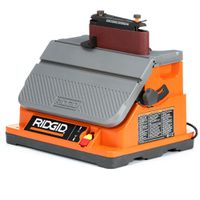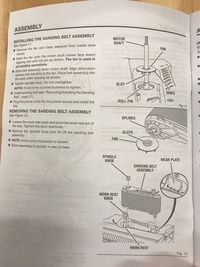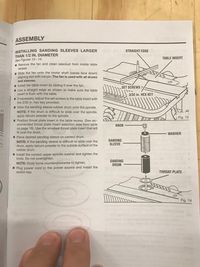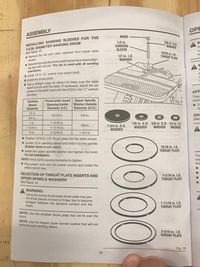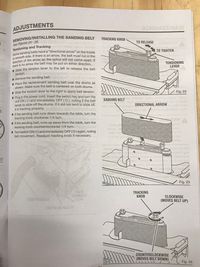Difference between revisions of "Rigid Oscillating Edge/Belt Spindle Sander"
Joe.Gravelle (talk | contribs) (→Maintenance) |
Joe.Gravelle (talk | contribs) |
||
| Line 9: | Line 9: | ||
No ferrous metal allowed. You may sand plastic, fiberglass, wood, aluminum. Be aware of this should you not want to cross contaminate your material. | No ferrous metal allowed. You may sand plastic, fiberglass, wood, aluminum. Be aware of this should you not want to cross contaminate your material. | ||
| + | |||
| + | The lock knob tends to get tight after a while. It is safe to use a pair of channel lock pliers with a towel over the knob to loosen it. | ||
| Line 18: | Line 20: | ||
locking stops for common angles | locking stops for common angles | ||
| + | |||
| + | |||
=Useful References= | =Useful References= | ||
Latest revision as of 13:50, 12 May 2019
Location: Wood Zone
Point Of Contact @joe.gravelle on Slack
Contents
General Policies for the Rigid Oscillating Edge/Belt Sander
Wear safety glasses and a dust mask Connect dust collection to the sander
No ferrous metal allowed. You may sand plastic, fiberglass, wood, aluminum. Be aware of this should you not want to cross contaminate your material.
The lock knob tends to get tight after a while. It is safe to use a pair of channel lock pliers with a towel over the knob to loosen it.
Equipment Features
Removable oscillating belt sanding attachment
multiple oscillating spindle sizes
locking stops for common angles
Useful References
Rigid Oscillating Edge/Belt Sander manual [1]
How to change spindles or swap the belt for a spindle
|
|
Maintenance
Regular maintenance will be undertaken by the POC. Please clean off any dust / debris once finished using the sander.
If a sanding spindle or belt is not working well it may need to be cleaned or replaced. Please notify the POC.
